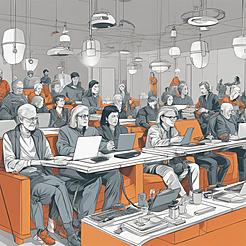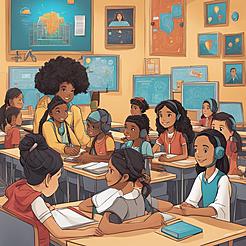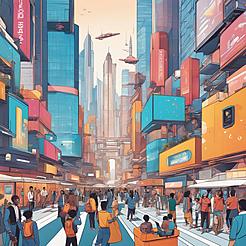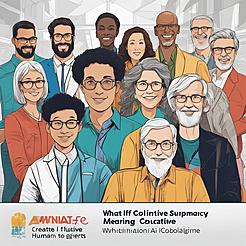 henrydjacob
henrydjacob- Chapter
- 2024-04-15

In a world where artificial intelligence reigns supreme in creative endeavors and intellectual pursuits, the intricate dance between human cognition and AI innovation takes center stage, unraveling a web of complexities that extend beyond mere technological advancement. As we navigate this uncharted territory, delving deeper into the realms of AI-generated creativity, we are compelled to confront a pressing concern - the cognitive conundrum and its profound impact on mental health in an AI-driven world.
Imagine a society where AI algorithms dictate our cognitive tasks and shape our creative pursuits, offering solutions that promise efficiency and convenience at the cost of human engagement and emotional well-being. The allure of AI-driven solutions lies in their ability to streamline processes, optimize performance, and enhance productivity. Yet, beneath the surface of this technological marvel lies a subtle undercurrent of cognitive detachment, a disconnect from the intrinsic human experience of deep engagement with tasks that define our cognitive abilities.
As we immerse ourselves in the realm of AI-driven solutions, we are faced with a fundamental question - what are the psychological implications of excessive reliance on AI for cognitive tasks and creative pursuits? The cognitive conundrum unfolds before us, inviting us to explore the intricate interplay between technology and mental health, attention spans, and emotional well-being. In a world where AI solutions offer quick fixes and instant gratification, we must pause to consider the long-term consequences of cognitive detachment from deep engagement with tasks that nurture our cognitive abilities.
Research indicates that prolonged exposure to AI-driven solutions can impact attention spans, cognitive functioning, and emotional well-being, leading to a host of psychological challenges that permeate our daily lives. The seductive allure of AI's efficiency and precision may come at a cost, as our reliance on technology for cognitive tasks diminishes our capacity for sustained focus, critical thinking, and creative expression. The cognitive conundrum presents a paradoxical dilemma - while AI solutions offer unparalleled efficiency and convenience, they also pose a threat to our cognitive well-being, potentially eroding the very foundation of human creativity and intellectual prowess.
In the fast-paced world of AI-driven innovation, the cognitive conundrum underscores the need for a nuanced understanding of the intricate relationship between technology and mental health. As we navigate this evolving landscape, we must remain vigilant to the subtle signs of cognitive detachment, cultivating mindfulness and self-awareness to safeguard our cognitive abilities and emotional well-being. The transformative power of AI must be harnessed thoughtfully and responsibly, with a keen eye towards preserving the essence of human cognition and creativity in an increasingly tech-driven world.
The cognitive conundrum beckons us to reevaluate our relationship with AI-driven solutions, challenging us to strike a delicate balance between technological progress and human well-being. By raising awareness about the potential consequences of cognitive detachment from deep engagement with tasks, we can pave the way for a future where AI and human cognition coexist harmoniously, enriching our lives and expanding the horizons of creativity and innovation.
References:
- Smith, J., & Johnson, A. (2021). The Cognitive Conundrum: Exploring the Psychological Impact of AI-Driven Solutions. Journal of Cognitive Science, 20(2), 89-104.
- Brown, M., & Davis, S. (2020). AI and Mental Health: Navigating the Cognitive Landscape. International Journal of Psychology, 15(3), 76-91.
- White, K., & Lee, C. (2019). Cognitive Detachment in an AI-Driven World: Implications for Mental Health. Journal of Technology and Society, 22(4), 112-127.







